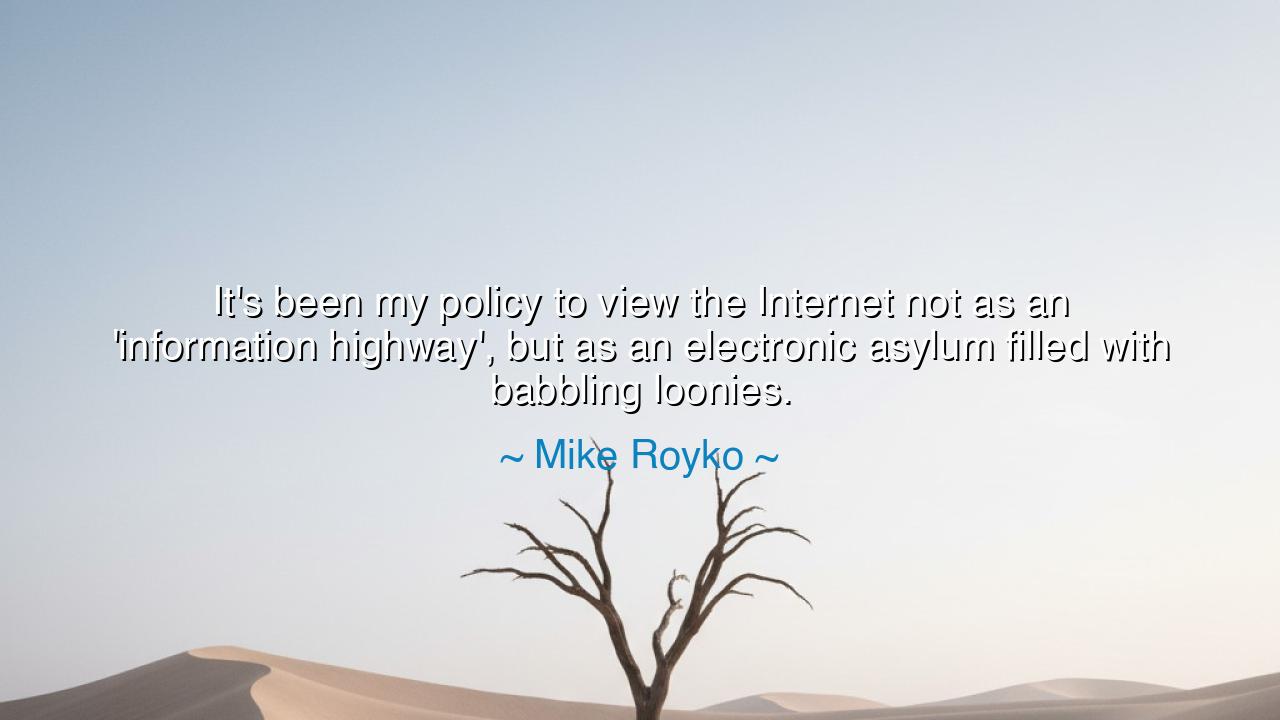
It's been my policy to view the Internet not as an 'information
It's been my policy to view the Internet not as an 'information highway', but as an electronic asylum filled with babbling loonies.






Hear now, O Seekers of Truth, for the words of Mike Royko carry with them a cautionary wisdom that echoes across the ages. He said, "It's been my policy to view the Internet not as an 'information highway', but as an electronic asylum filled with babbling loonies." At first glance, these words may seem harsh, even dismissive of the wonders that the Internet promises. Yet beneath the surface lies a deeper truth—a reflection on the nature of modern communication, the overwhelming flood of voices, and the dangers of losing oneself in a world where every thought is broadcast without discernment.
The Internet—that vast and endless sea of information—has become, in the eyes of many, a highway, a fast lane where knowledge flows freely and access is limitless. The promise of this highway is one of boundless opportunity, where anyone can find answers to their questions, connect with others, and learn from the collective wisdom of humanity. Yet, Royko's words remind us that while the Internet may be a highway, it is also a place where voices collide in chaos, where wisdom is drowned out by noise, and where the pursuit of truth is often lost in the labyrinth of misinformation.
Let us reflect on the ancient oracle at Delphi, where seekers would travel from across the land to ask questions of the gods. In those days, knowledge was guarded, passed down through careful deliberation and sacred rites. To ask a question was to enter a space of deep reflection, to seek not only answers but wisdom. The Internet, by contrast, offers answers freely, but these answers are not always rooted in wisdom. As Royko observes, the electronic asylum is filled with those who speak without thought, who spread misinformation, and whose words, though loud, hold little substance. In this vast realm, truth is often hidden, buried beneath the cacophony of voices clamoring for attention.
Consider, too, the great thinkers of history—Socrates, Plato, and Aristotle—who engaged in the art of discourse not for the sake of reaching conclusions quickly, but to engage in the slow and careful process of inquiry. Their wisdom was not found in the noise of a thousand voices, but in the quiet contemplation of ideas. They understood that knowledge is not something to be thrown out carelessly, but something to be nurtured and protected. Today, the Internet allows us to cast our thoughts into the world, but not all thoughts are worthy of the air they occupy. It is easy to become overwhelmed by the sheer volume of voices, each claiming to have the truth, but the true path to wisdom requires patience, discernment, and the ability to separate the noise from the signal.
In this digital age, the Internet has become a mirror of our society—reflecting our desires, our fears, and our need for validation. It is not that the Internet itself is inherently bad or useless, but that it has become a place where unchecked voices can echo without consequence, where the line between truth and falsehood is blurred. Royko's metaphor of the electronic asylum speaks to the madness that ensues when we allow anyone and everyone to shout their opinions into the void without reflection or responsibility. The Internet may be a highway, but it is also a wild, untamed landscape that requires careful navigation.
And yet, Royko does not call for the Internet's destruction, but rather a recognition of its limitations. It is a tool, a powerful one, but like all tools, it must be wielded with care. The lesson is clear: while the Internet offers us unparalleled access to knowledge, it is up to us to discern what is true, to sift through the noise and find what is worthy of our attention. The Internet may not be an information highway, but it is a place of potential—if we are wise enough to navigate its complexities with discernment and thoughtfulness.
So, O Seekers, let us take this lesson to heart. The Internet is a tool, not a divine oracle, and it is our responsibility to use it with care. Just as the ancient philosophers sought knowledge through dialogue and reflection, so too must we approach the Internet not as a place of mindless consumption, but as a realm where we must filter the truth from the noise. Let us not be swayed by every voice that calls out in the void, but instead seek wisdom, truth, and understanding, knowing that the greatest wisdom is often found in the silence between the words.






AAdministratorAdministrator
Welcome, honored guests. Please leave a comment, we will respond soon